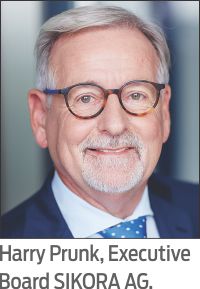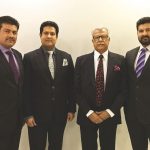SIKORA presented its measuring, control, inspection and sorting technology recently at the wire China in Shanghai and at the Wire & Cable India in Mumbai. WCI’s Interview with Harry Prunk, Executive Board SIKORA AG:
 Wire & Cable India: Which trends in terms of technology did you recognize in the Wire and Cable Industry?
Wire & Cable India: Which trends in terms of technology did you recognize in the Wire and Cable Industry?
Harry Prunk: From what we see, cable suppliers have re-focused, as the market has changed in regards of quality demands, costs and production efficiency. Therefore, all companies are currently focusing on optimizing their extrusion processes. Repeatability of the process is the keyword, as quality is not only required today, but every day for up to 24 hours of production.
A few years ago, diameter measuring devices were used exclusively for monitoring the quality-relevant parameters. In recent years, we see a change here: only if the line is controlled in automatic mode, the human influences on the processes are eliminated, the quality measurably improved. Today, we see that further steps had been taken already.
WCI: What are these further steps?
HP: Here are five examples: At the manufacturing of optical fibers, we see that today manufacturers care about temperature, they care about airlines in the fiber cladding and they consequently monitor the detection of even the shortest lumps in the coating of the fiber.
In the area of data cables, manufacturers always did a capacitance measurement. Today they also need online information on the Structural Return Loss (SRL). At the manufacturing of automotive cables, manufacturers look for a perfect adhesion of the insulation to the conductor as those cables are in the following steps automatically processed, which requires high uniformity of the product. In the area of cable sheathing, manufacturers look for concentricity in order to reduce cost and in the field of high voltage cables, manufacturers demand absolute cleanliness of the insulating material in order to avoid cost resulting from breakdowns at discharge tests. I conclude that manufacturers rechecked and redefined all of their processes.
WCI: What are your comments on the global cable market outlook in the near term?
HP: The global cable market is still faced with major challenges which must be addressed, amongst others, in terms of infrastructure – not only in the developing countries, but also in highly developed countries. We see all of these changes globally, when it comes to the power supply based on wind and solar energy. Further, we see the discussions about electrically operated vehicles and the increasing demand for higher data volumes in the communication. All these changes present new challenges for us – not only in the near future but also in the long term.




